Related Research Articles

Sir Henry Lauder was a Scottish singer and comedian popular in both music hall and vaudeville theatre traditions; he achieved international success.
Para Handy is a character created by the journalist and writer Neil Munro in a series of stories published in the Glasgow Evening News between 1905 and 1923 under the pen name of Hugh Foulis. He is the crafty Gaelic skipper of the Vital Spark, a Clyde puffer (steamboat) of the sort that delivered goods from Glasgow to Loch Fyne, the Hebrides, and the coast of Argyllshire and Inverness-shire in the early 20th century.
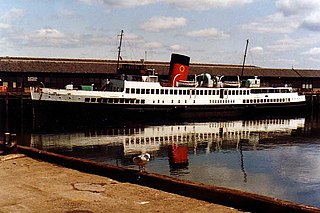
The Clyde steamer is the collective term for several passenger services that existed on the River Clyde in Scotland, running from Glasgow downstream to Rothesay and other towns, a journey known as going doon the watter.

Sir Lewis Thomas Casson MC was an English actor and theatre director, and the husband of actress Dame Sybil Thorndike.
The Glasgow Fair is a holiday usually held during the second half of July in Glasgow, Scotland. 'The Fair' is the oldest of similar holidays and dates to the 12th century. The fair's earliest incarnation occurred in 1190, when Bishop Jocelin obtained permission from King William the Lion to hold the festivities.

Neil Munro was a Scottish journalist, newspaper editor, author and literary critic. He was basically a serious writer, but is now mainly known for his humorous short stories, originally written under the pen name Hugh Foulis. The best known of these stories are about the fictional Clyde puffer the Vital Spark and her captain Para Handy, but they also include stories about the waiter and kirk beadle Erchie MacPherson and the travelling drapery salesman Jimmy Swan. They were originally published in the Glasgow Evening News, but collections were published as books. A key figure in Scottish literary circles, Munro was a friend of the writers J. M. Barrie, John Buchan, Robert Bontine Cunninghame Graham and Joseph Conrad, and the artists Edward A. Hornel, George Houston, Pittendrigh MacGillivray and Robert Macaulay Stevenson. He was an early promoter of the works of both Conrad and Rudyard Kipling.
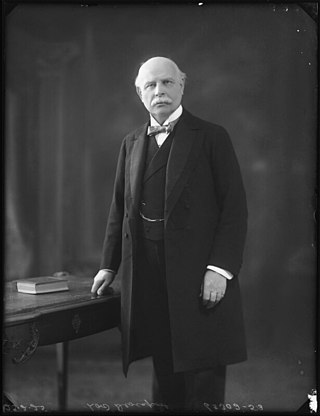
Hudson Ewbanke Kearley, 1st Viscount Devonport,, styled Lord Devonport between 1910 and 1917, was an English grocer and politician. He founded the International Tea Company's Stores, became the first chairman of the Port of London Authority, and served as Minister of Food Control during World War I.
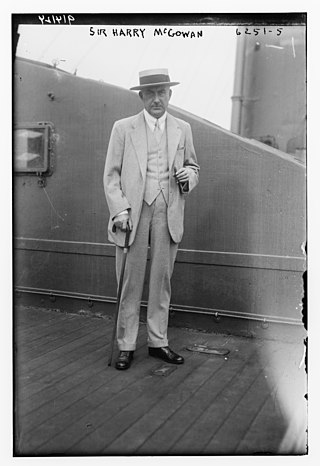
Harry Duncan McGowan, 1st Baron McGowan KBE LLD DCL, was a prominent Scottish industrialist who served as Chairman of Imperial Chemical Industries for 20 years.
The Royalty Theatre, Glasgow was a theatre in Glasgow at the corner of Sauchiehall Street and Renfield Street. It was built in 1879 as part of a development by the Central Halls Company chaired by David Rattray, and was one of the first theatre designs of Frank Matcham. In 1895 it was one of the four theatres brought together by Baillie Michael Simons of Glasgow in a new company Howard & Wyndham Ltd. The Royalty staged plays, opera, and musical comedy and later became home to repertory theatre
The Glasgow Unity Theatre was a theatre group that was formed in 1941, in Glasgow. The Unity theatre movement developed from workers' drama groups in the 1930s, seeing itself as using theatre to highlight the issues of the working class being produced by and for working-class audiences. Its demands were "for new Scots plays by new Scottish writers to be performed by native actors." The movement had strong links with the Communist Party of Great Britain and the Left Book Club Theatre Guild.

Theatre in Scotland refers to the history of the performing arts in Scotland, or those written, acted and produced by Scots. Scottish theatre generally falls into the Western theatre tradition, although many performances and plays have investigated other cultural areas. The main influences are from North America, England, Ireland and from Continental Europe. Scotland's theatrical arts were generally linked to the broader traditions of Scottish and English-language literature and to British and Irish theatre, American literature and theatrical artists. As a result of mass migration, both to and from Scotland, in the modern period, Scottish literature has been introduced to a global audience, and has also created an increasingly multicultural Scottish theatre.
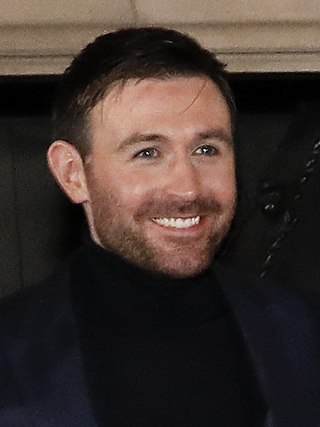
James John McArdle is a Scottish actor. He won the Ian Charleson Award for his role as Mikhail Platonov in Platonov and was nominated for an Laurence Olivier Award for Best Actor in a Supporting Role for portraying Louis Ironson in Angels in America.

Birmingham Repertory Theatre, commonly called Birmingham Rep or just The Rep, is a producing theatre based on Centenary Square in Birmingham, England. Founded by Billie Lester, it is the longest-established of Britain's building-based theatre companies and one of its most consistently innovative.

The Scottish Exhibition of National History, Art and Industry was held in Glasgow in 1911. It was the third of 4 international exhibitions held in Glasgow, Scotland during the late 19th and early 20th centuries.
The Scottish Community Drama Association (SCDA) is an association of amateur dramatic clubs throughout Scotland. It was first founded in 1926. Amateur theatre companies in Scotland have generally presented repertoire in English, Lowland Scots and, more occasionally, Scottish Gaelic.

Sir Samuel Chisholm, 1st Baronet, was a Scottish Liberal politician and Lord Provost of Glasgow.
Robert Trotter was a Scottish actor, director, and photographer.

Literature in modern Scotland is literature written in Scotland, or by Scottish writers, since the beginning of the twentieth century. It includes literature written in English, Scottish Gaelic and Scots in forms including poetry, novels, drama and the short story.

William Armstrong, CBE was a British actor, theatre manager and director, associated for many years with the Liverpool Playhouse, where as director he was an important influence on young actors in his company, including, at various times, Robert Donat, Robert Flemyng, Rex Harrison, Michael Redgrave and Diana Wynyard.
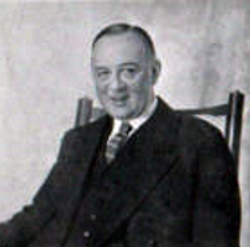
Alfred John Wareing was an English actor-manager. He was a pioneer of the repertory theatre in Britain and an authority on the plays of Shakespeare.
References
- 1 2 Moran, James (2013). Regional Modernisms. Edinburgh University Press. p. 96. ISBN 9780748669301 . Retrieved 3 February 2020.
- ↑ McDonald, Jan (1993). Chekhov on the British Stage. Cambridge University Press. p. 39. ISBN 0521384672 . Retrieved 3 February 2020.
- ↑ Osborne, Brian D. & Armstrong, Ronald, "Introduction", Munro, Neil (2002), Erchie, My Droll Friend, Birlinn, Edinburgh, pp. xix - xxviii, ISBN 9781841582023
- ↑ Slade, Brian (28 April 2018). Simon Cadell: The Authorised Biography . Retrieved 3 February 2020.
- ↑ Brown, Ian (20 October 2013). Scottish Theatre: Diversity, Language, Continuity. Rodopi. p. 136. ISBN 9789042037434 . Retrieved 3 February 2020.
- 1 2 "Records of Scottish Repertory Theatre, theatre company, Glasgow, Scotland - Archives Hub". archiveshub.jisc.ac.uk.
- ↑ Rowell, George (1984). The Repertory Movement: A History of Regional Theatre in Britain. Cambridge University Press. p. 78. ISBN 0521237394 . Retrieved 3 February 2020.